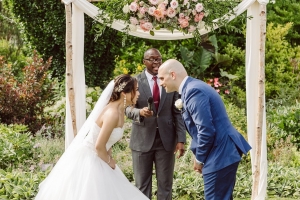Trust can be such a fragile thing, can't it?
One moment, it seems solid, and the next, it may feel like it's slipping through your fingers. When trust wavers, it can bring tension, doubt, and a sense of distance into the relationship.
But does it always have to be the end of the road?
Absolutely not! Relationships have their ups and downs, and trust issues are usually just one chapter in the story. The good news is that with the right steps and understanding, couples can rebuild what feels broken.
Whether it is about strengthening communication, creating a safe space for honesty, or simply learning to listen better, the right relationship advice can make all the difference.
So, let us go into some ways we might find clarity and connection when trust is hard to hold.
Why is trust so important in relationships?
Trust is the basis of any healthy relationship. When you do not have trust, everything else can be very shaky, right?
It is what allows two people to feel safe, open, and connected. You can let your guard down when you feel someone is going to protect your heart and not hurt it.
It is what makes vulnerability possible and creates space for true intimacy. Without trust, even the simplest interactions feel tense or uncertain; doubts creep in, and misunderstandings multiply.
But trust does not mean perfection—it is about consistency, honesty, and effort. When trust is strong, love feels more secure and real. That is why it matters so much.
What are the three C's of trust in a relationship?
When trust feels fragile, it can be overwhelming to know where to start rebuilding. But sometimes, the simplest frameworks can bring the most clarity. Enter the "three C's" of trust—three guiding principles that can anchor a relationship even in its most uncertain moments.
- Communication: Honest, open conversations build trust. Sharing thoughts, fears, and feelings shows transparency while speaking up and listening without judgment keeps the connection strong.
- Consistency: Trust grows through reliability. Following through on promises and showing up when it matters makes someone feel secure—it is the little everyday actions that count most.
- Compassion: Patience, forgiveness, and kindness strengthen trust. Supporting each other's flaws instead of criticizing creates a bond that feels safe and steady.
How can relationship advice from a therapist help you build trust
Ever feel like rebuilding trust is just too overwhelming?
That is where relationship advice from a therapist can make all the difference. A relationship therapist offers a safe, neutral space to explore what caused the cracks in trust and how to repair them.
They guide you through practical tools, like improving communication and setting boundaries, while helping you uncover deeper patterns that might be holding you back.
Their insights can help you reconnect as a team, offering relationship advice for couples that feel tailored to your unique situation.
Along the way, you learn how to be a better partner in a relationship—more understanding, patient, and present. It is not about quick fixes; it is about lasting change that brings you closer.
11 best relationship advice for couples struggling with trust
Trust is one of the tricky aspects of any relationship, especially when it seems that the very foundation of your relationship has been shaken.
The good news, however?
It's never too late to rebuild. Whether you are dating or seeking advice for married couples, there are practical steps that can help you reconnect and strengthen your bond.
Let's discuss some of the best relationship advice to rebuild trust and make a more secure connection.
1. Be honest, no matter how hard it gets
Honesty in rebuilding trust is a foundation, no matter how unpleasant it feels. Share thoughts and feelings openly, messy or complicated as they are. Holding back creates distance, but transparency builds bridges.
It creates a more solid foundation when both of them commit to telling the truth, even on seemingly minute things. Don't forget, it is not only about sharing facts, but also about sharing hearts.
2. Listen for understanding, not to answer
It's very easy to get defensive when trust has been broken, but listening with an open mind can change everything. When someone feels truly heard, it creates safety and reassurance. Focus on their words and emotions without rushing to defend yourself or fix things.
Sometimes, understanding their pain or perspective is more healing than offering solutions. This type of listening shows you care deeply about their experience.
3. Set clear and realistic boundaries
Boundaries are not about control—they are about clarity. Discuss what you both need to feel safe and respected. Whether it is about sharing passwords, spending time apart, or discussing sensitive topics, boundaries create a sense of security.
Honor these agreements consistently and check in regularly to adjust as needed. This step can help you both rebuild confidence in each other's intentions and actions.
4. Apologize sincerely and take responsibility
A heartfelt apology goes a long way when trust is broken. Acknowledge what went wrong, and take ownership of your part without deflecting or minimizing. A sincere "I am sorry" includes understanding the impact of your actions and committing to change.
Words are strong, but actions follow through with these words; this means that you care about healing and rebuilding.
5. Be patient-it takes time
You cannot fix rebuilding trust overnight. You have to spend time being consistent. So be patient with each other, especially in times when you feel the other may not do the right thing or is having a setback. Repeated actions show trust instead of making hasty promises.
Celebrate the little victories; it could be an open conversation or moments of vulnerability shared. Patience reminds your partner that the relationship is worth all the effort when progress is slow.
6. Professional help
At times, it can feel overwhelming to handle trust issues on one's own. This is where learning how to get relationship advice from a therapist can transform things.
Therapists offer tools and strategies tailored to your unique situation to help you untangle complex emotions and patterns. Asking for help is not a weakness; it's the way to become stronger as a couple.
7. Make your partner feel special every day
Actions speak louder than words, especially when rebuilding trust. Let your partner feel the small, constant actions- leaving a thought, checking up during busy hours, or simply being present.
All these tiny actions remind them they matter to you. It's not only fixing what's broken but building an even deeper and loving relationship.
8. Consider your behavior
Take time to think about what your actions might do for your partner.
Can you improve communication, be kinder, or create an environment where honesty feels safe?
Self-awareness can help you become a better partner. When two individuals are willing to grow and learn, trust can fill the space. It has nothing to do with being perfect. It has everything to do with being present and desiring change.
9. Engage in consistent communication
Trust thrives in an environment where communication is open and frequent. Check-in with each other regularly—not just when things feel tense.
Share updates about your day, your feelings, or even your hopes for the future. These moments of connection strengthen your bond and rebuild trust. When communication becomes a daily habit, misunderstandings shrink, and the relationship feels more secure.
10. Focus on reconstruction, not reliving the past
While it is important to admit past mistakes, staying mired in them prevents healing. Acknowledge what has happened, learn from it, and shift your energy toward rebuilding a better future together.
Dwelling on the past creates resentment, but growing shows commitment to the relationship. This mindset makes the two partners feel hopeful and motivated to work toward a stronger trust and connection.
11. Celebrate progress together
Rebuilding trust is tough, so be sure to recognize the steps you've both taken. It's great to celebrate those moments, from the hard conversations to showing vulnerability or respecting boundaries.
Knowing that progress has been made can reinforce good behavior and keep the ball rolling, but it also reminds the couple that trust does build over time with a bit of effort and thus brings a relationship back on track.
To sum up
Trust takes time to rebuild, one step, one conversation, and one act of kindness at a time. That calls for patience, effort, and the commitment of both parties involved to build a stronger and more connected relationship.
Let's not forget that being perfect is not about trusting someone; it is showing up, being honest, and choosing each other each day. Some days are going to be harder than others, but every little victory matters.
Whether it's relying on professional guidance, practicing forgiveness, or listening more openly, relationship advice for married couples can provide them with valuable tools to move forward.
With the right mindset and actions, you can form a bond that feels even more secure and loving than before. Trust can grow again—it really can.






